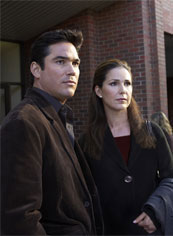 From Sherlock Holmes to “Dragnet” to “CSI,” we like to see a killer get his, in the form of comeuppance when the detective solves the crime, or in the judge’s sentence, or best of all when he (or she) comes to some deservedly untimely end. But what’s the opposite of typical justice? You’ll see it in Sunday’s made-for-TV movie “Crossroads,” on CBS.
From Sherlock Holmes to “Dragnet” to “CSI,” we like to see a killer get his, in the form of comeuppance when the detective solves the crime, or in the judge’s sentence, or best of all when he (or she) comes to some deservedly untimely end. But what’s the opposite of typical justice? You’ll see it in Sunday’s made-for-TV movie “Crossroads,” on CBS.
Justice is served perfectly when a grieving man works out a deal with the teenaged killer of his wife and child that gives them both new life. What’s amiss here is that “Crossroads,” a Hallmark Hall of Fame Presentation, touts itself as tale of forgiveness, which, some would say, is precisely what justice is not.
Not to say that the Bruce Murakami, the real-life man whose story is told in “Crossroads” and played here by Dean Cain (Superman on “Lois & Clark: The New Adventures of Superman”), didn’t forgive the real-life Justin Gutierrez after the drag-racing teen plowed into the family van carrying Cindy and Chelsea Murakami. In an interview with Murakami provided by Hallmark, he relates how, alone in the midst of grieving, he would say aloud, “I forgive you, Justin.”
No less astonishing is the plea bargain that Murakami worked out with Gutierrez after four years of delays by the teenager’s defense team. “I ruined five lives that day,” says Gutierrez in Hallmark’s version of the events that began with the crash in November 1998. “Six if you count me. Eight if you count my parents.” Murakami’s decision to wrest the power of justice from the courts was an uplifting, even transforming decision for both families involved.
Perhaps in hopes of breathing life into their fading made-for-TV movie franchise, Hallmark handed “Crossroads” to director John Kent Harrison, whose John Paul II bio-pic was considered a solid example of the genre. Harrison tells the story in large part as a crime procedural. Cain is nicely cast as the hot-headed Murakami, who at first demands justice for the perished members of his family and who blindly ignores his two sons in his grief.
The movie only skims the surface of its spiritual subject, however. The script telescopes the timeline into what seems like a few weeks, inhibiting our understanding of Murakami’s emotional arc and needlessly babying the viewer. Worse, it unquestioningly depicts Murakami’s first sight of Gutierrez: Expecting a metal-head, multiply pierced thug, he is jarred to encounter a clean-cut prep–so would a thug be any less deserving of his compassion?
Not everyone would agree that what Murakami does serves either God or humans. “Crossroads” shirks this debate, and never asks about the difference between the deal Murakami struck with his wife’s killer and the open-ended forgiveness the real Murakami felt in his darkest moments. Instead, forgiveness remains unexplored territory in the media: Strange, since virtue occupies such a central place in the Christian teachings so widely ascribed to in our culture, articulated so plainly in the Lord’s Prayer said by millions every week.


